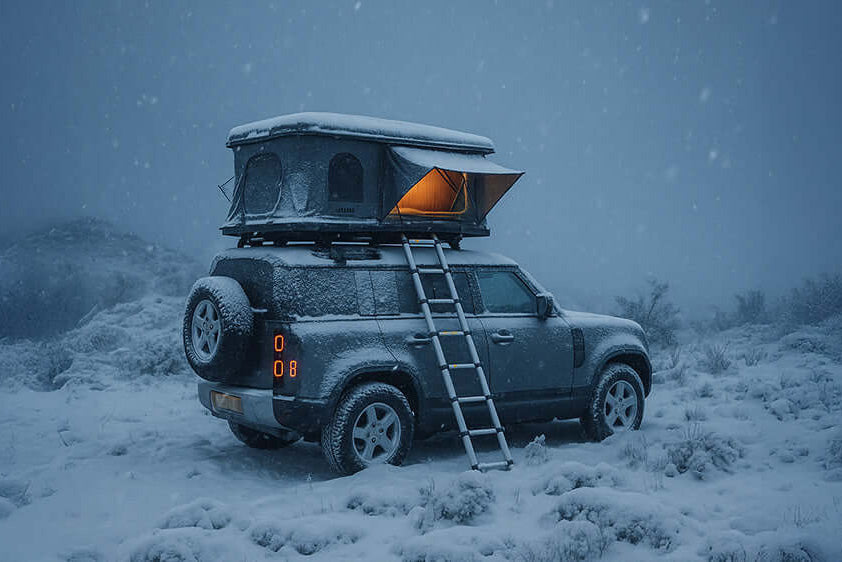Wild camping is a true dream for many rooftop tent enthusiasts and adventurers – waking up in the morning with a view of the mountains or the sea, camping far away from mass tourism, and simply following your own route. Italy also entices with its incredible variety of landscapes: from the Alpine panorama to Tuscany to the coast of Calabria. But what is the legal situation? Where is it (still) permitted to camp wild in Italy – and where should caution be exercised?
In this article, you'll find all the important legal information, tips for alternative pitches, and advice on how to avoid trouble while camping.
The legal situation in Italy
In Italy, wild camping is also prohibited.
This means that spending the night in a vehicle or tent outside of official campsites is not permitted – whether on the beach, in the forest or in the mountains.
Camping is particularly strictly prohibited in the following places:
- In national parks and nature reserves
- Directly on beaches and coastal areas
- On public land such as parking lots, streets or squares in towns
- Near historical buildings, churches or sights
- On private agricultural land without permission
Fines for illegal camping range from €100 to over €500 , depending on the region and protected status. In national parks, the fine can be significantly higher.

Bivouac: The exception
As with wild camping in France , Italy also has the so-called "bivacco" – simply spending one night there, usually in remote mountain regions. This is tacitly tolerated or even permitted in some places – but clear rules apply here too:
- Just one night
- No visible camping behavior (e.g. B. no chairs, tables, awning)
- No open fire
- As inconspicuous as possible – and leave early
Important: The tolerance of bivouacs usually only concerns hikers or mountaineers and applies especially in remote high altitudes (e.g. (e.g., Dolomites, Aosta Valley). Those arriving by car quickly fall through the cracks.
Freestanding with a roof tent: A grey area
Italy distinguishes between parking and camping. This means:
- Parking is permitted unless prohibited by signs.
- Legally, camping begins with “living” in the vehicle: unfolding the roof tent , setting up the camping table , cooking, extending the awning – this is no longer parking, but wild camping.
Tip: Those who only sleep overnight, behave inconspicuously, and leave no trace are tolerated in some places—especially in remote areas. However, the risk is significantly higher in tourist regions or near the coast.
Penalties for wild camping in Italy
The amount of the fines varies greatly. Expect:
- €100–500 in most regions
- up to €1,000 in protected areas or for violations of environmental regulations
- Possibly also towing or expulsion
Therefore: Always be well informed and, if in doubt, go to an official parking space.
The most beautiful regions for your roof tent adventure
Despite all the regulations, Italy offers plenty of opportunities for overnight stays close to nature – both legal and safe. Especially popular with rooftop tent fans:
- South Tyrol & Dolomites: Dreamlike mountain landscapes and many small pitches
- Tuscany: rolling hills, wineries and some hospitable agriturismi
- Umbria & Marche: Insider tips for nature lovers, less touristy
- Sardinia: Outside of peak season, you can find quiet places – but only legally!
- Abruzzo & Calabria: Unspoilt nature and warm hospitality

Legal alternatives to wild camping in Italy
Even though free camping is difficult, there are many great alternatives:
Agriturismo / Agricampeggio
Many farms offer pitches—some free of charge, often with catering options. Perfect for authentic camping away from the crowds.
Area Sosta Camper
Official RV parks, some with fees, often with water and waste disposal. Not always idyllic, but legal and safe.
CamperContact, Park4Night & Co.
Platforms like Hinterland.camp , Park4Night, and CamperContact list legal sites, reviews, and photos. A great help, especially for rooftop tent travelers.
Campsites (also for roof tents)
Especially in Italy, there are many small, charming campsites – often family-run, affordable, and located in the heart of nature.
Our tips for roof tent trips in Italy
- Check the local regulations in your area beforehand.
- Avoid visible camping behavior outside of official sites.
- Be respectful of nature and locals.
- No fire, no garbage – and if possible, leave no trace.
- Use apps and platforms for safe parking spaces.
- Talk to locals – many private individuals are happy to offer parking spaces.
Conclusion: Wild camping in Italy? Yes – but with caution
Wild camping in Italy isn't officially permitted, but it's tolerated under certain conditions if you behave respectfully and discreetly. The better solution: authentic campsites, small farms, or simple campsites that offer exactly the feeling of freedom you're looking for—but legally.
With proper preparation, consideration, and the right roof tent, nothing will stand in the way of your Italian adventure. Buon viaggio!



Leave a comment
All comments are moderated before being published.
This site is protected by hCaptcha and the hCaptcha Privacy Policy and Terms of Service apply.